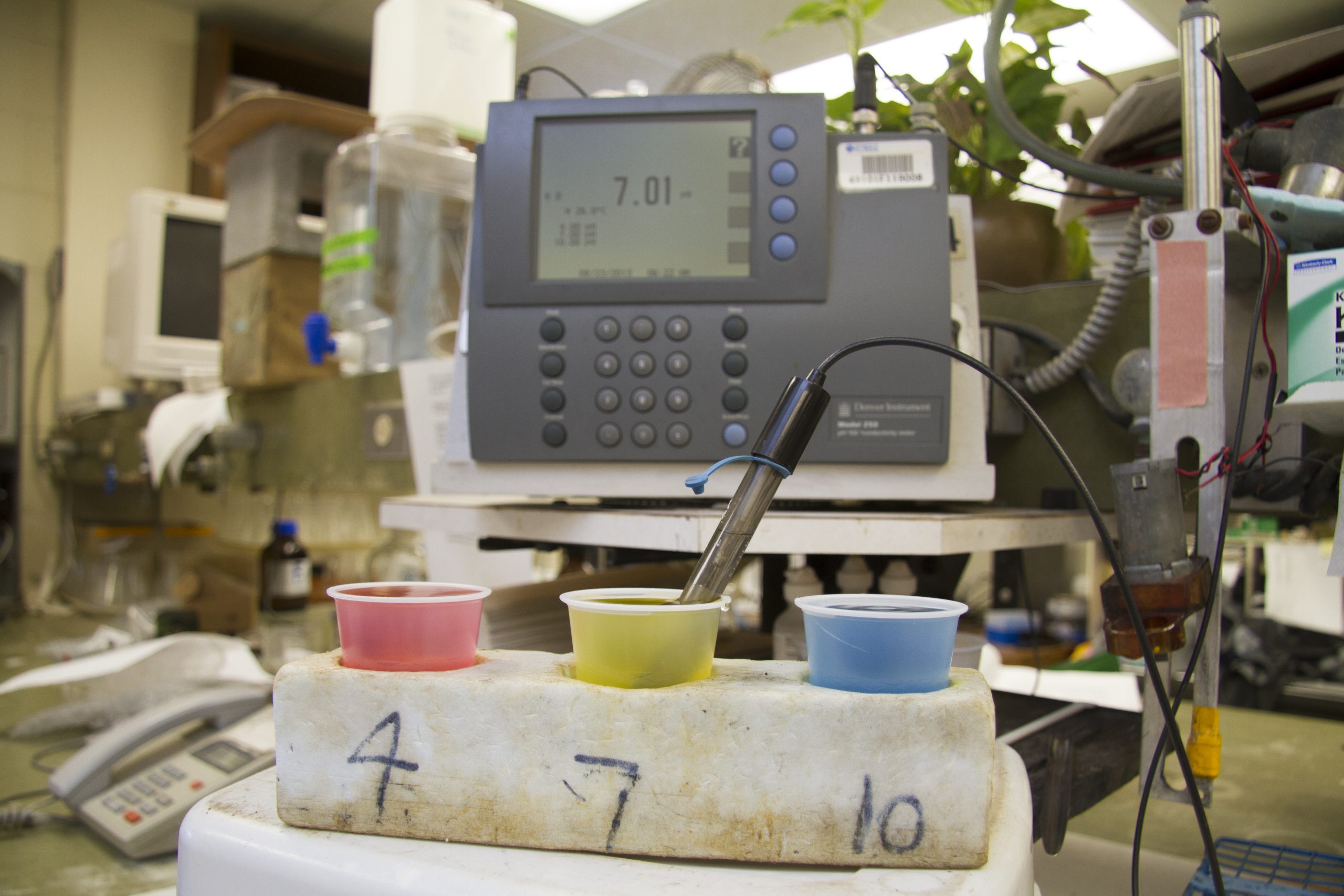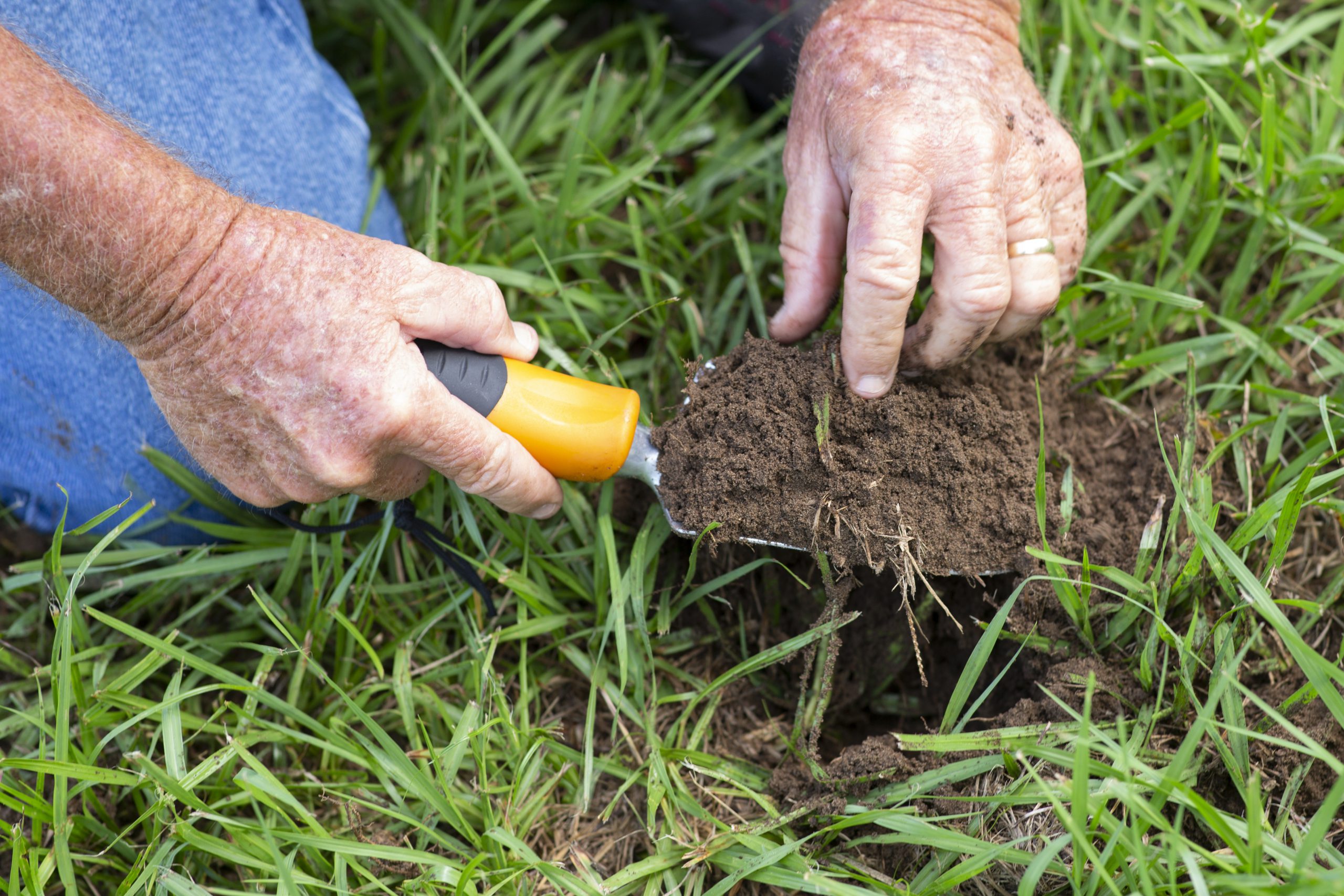Summary
- Orange County Plant Clinic temporarily paused soil pH testing, but effective August 1st, 2023 we will resume offering this service for $2 per sample. This service is for residential samples only. If you are a contracted landscaper or horticulture professional, please utilize the UF/IFAS Soil Testing Laboratory or SoilKit®.
- Soil pH is important to understanding your plant’s ability to uptake available nutrients.
- Before establishing or renovating a landscape, submit a soil sample to the soil testing lab.
- Consider the pH of your soil before selecting plant materials for your landscape.
- There are three options for getting your soil pH tested in Orange County, discussed below.
- Soil samples should be collected at depth of ~4 inches and should be generally free of debris or other bark and leaf materials.
What does soil pH mean?

Soil pH is an indicator of how acidic or alkaline your soil is. Soil pH outside the recommended plant range (5.5-7.0) will impact a plant’s ability to uptake minerals and nutrients already present in the soil profile, leading to nutrient deficiencies and reduced plant growth. The ideal pH range for vegetable and flower gardens with sandy soils is between 5.8 and 6.3; however, if your soil pH is between 5.5 and 7.0, no adjustments need to be made (Gardening Solutions, Soil pH.) If your soil pH is within 0.5 of a pH unit of this ideal pH range, any adjusting to the pH is unlikely to improve overall plant performance (EDIS #SL 256).
While 5.5-7 is the optimum pH range for the majority of cultivated plants, some require pH levels outside of this range. In general, plants that are best suited for the natural pH of the soil present should be selected for a landscape. While additives that raise or lower soil pH are available, the effects of these supplements are often temporary (EDIS #SL 256). To select plants best suited for your pH, be sure to check out The Florida-Friendly Landscaping™ Guide to Plant Selection & Design.
Getting your Soil Tested
In Orange County, there are three methods of getting your soil pH tested. If you reside in a different county, option 2 & 3 are still available, but check with your local county Extension office to see if local pH testing is available. The Orange County Plant Clinic pH testing is for residential samples only. If you are a landscape professional or commercial grower, please utilize option 2 or 3.
Available Testing Options:
|
1. Orange County Plant Clinic |
2. UF/IFAS Soil Testing Laboratory |
3. SoilKit® |
|
| Cost |
$2 per sample (pH only) Exact cash or check only; we do not have a cash box to give change. |
$3 (pH + lime) or $10 (pH, lime, and nutrient analysis)
Check only; Cost does not include shipping |
$31.95 (pH, lime, and nutrient analysis)
Register kit and pay online at soilkit.com/florida |
| Sample Delivery Method | ·Local drop off M-Th, 10-5 pm
·UF/IFAS Extension Orange County Plant Clinic 6021 S. Conway Rd. Orlando, FL 32812 |
·Resident is responsible for paying postage and mailing their sample to the UF/IFAS Soil Testing Laboratory
·UF/IFAS Extension Soil Testing Laboratory, 2390 Mowry Road, Wallace Bldg. 631, Gainesville, FL 32611 |
·Includes a Pre-addressed, postage-paid mailer |
| Results | ·Emailed weekly on Fridays.
·Results include pH level and general amendment methods. ·If pH does not need to be amended, Plant Clinic can conduct consultation to work through plant problem(s). |
·Emailed in 2-3 business days.
·Results include pH level, nutrient analysis, and general amendment methods. ·Results emailed to Extension office and you can request guidance from Plant Clinic/Agent(s) on analyzing results. |
·Emailed in 1-2 business days.
·Results include pH level and product recommendations. ·All product recommendations are made by AgriTech Corp. UF/IFAS or FFL does not recommend or endorse products. ·You can easily share results with your county Extension Agent, landscapers, or anyone else who needs the information through methods such as text, email, and social media. |
| Plant(s) with Reportable Recommendations |
|
|
|
| Links | N/A | ·Landscape and Vegetable Garden Test Form |
·Order a University of Florida Soil Test Kit
|
Taking a Soil Sample
 Determine how many samples to take. You should send separate samples for turf areas, vegetable gardens, and ornamental beds. Each of these zones will have different recommendations based on plant types. If there are specific problem areas, samples from those regions should be sent separately as well.
Determine how many samples to take. You should send separate samples for turf areas, vegetable gardens, and ornamental beds. Each of these zones will have different recommendations based on plant types. If there are specific problem areas, samples from those regions should be sent separately as well.- For your first sample area, use a soil probe or shovel to dig 10-15 scoops of soil and add them to your bucket. The upper 2-4 inches of soil from lawn areas and the upper 6 inches for garden or landscape areas. Space out your collection sites throughout the area to ensure a uniform sample. Be sure to remove any mulch or plant material that ends up in the bucket.
- Next, use your hand to thoroughly mix the soil, uniformity is the goal.
- Spread your soil out on a paper bag or newspaper to dry. Wet soil can’t be submitted for testing, so this step is important.
- For local samples, please place soil sample in a sandwich sized zip top bag. If bringing multiple samples, please label which areas they are from (turf, vegetable, ornamental, etc.)
- For directions on mailing samples to UF/IFAS Soil Testing Laboratory or SoilKit®, please check out Gardening Solutions- Soil Testing.
Raising the pH of Acidic Soils
If your soil pH test results indicate that your soil is acidic, it is important to test for lime requirements before adding soil amendments to raise the pH. Soil testing options #2 and #3 automatically include lime testing; however, the Orange County Plant Clinic does not have the laboratory equipment to provide this service. Both the UF/IFAS Soils Testing Laboratory and SoilKit® reports will indicate the amount of limestone that should be applied to a specific area to reach the target pH.
To raise the pH of your soil, you will need to add a liming material such as calcium carbonate or dolomite.
- To add to a landscape prior to planting – liming material should be thoroughly mixed into the top 6 to 8 inches of soil.
- To add to an established landscape – lime can be surface-applied and watered in, but do not overwater (e.g., no more than 0.5 inches of water over the treated area).
- To add to turf – choose a non-caustic liming material (ag lime vs. calcium oxide [CaO]).
- If the recommended lime rate exceeds 25 lbs. per 1000 square feet, splitting the application and applying the liming materials over a period of 3 to 4 weeks will reduce the chances for plant-related issues.
Generally, it takes about 6 months for calcic and dolomitic lime to prove effective (EDIS #SL181). Therefore, it is important to follow product labels and only apply the recommended amount. After 6 months, you can retest your soil for pH and apply a second treatment, if needed.
Lowering the pH of Alkaline Soils
Typically, alkaline soils present greater challenges than acidic soil. While there are products to temporarily lower your soil pH, there is no permanent solution to maintaining a low soil pH. Reducing soil pH can be tricky, because overapplication can damage your plants. Instead, select plants that are tolerant of higher pH conditions to avoid chronic plant nutrition problems or grow select plants in containers.
If a lower pH is desired, add a sulfur amendment such as elemental sulfur, ammonium sulfate, iron sulfate, or aluminum sulfate.
- To add to a landscape prior to planting – sulfur can be incorporated directly into the entire planting bed to the depth of the root zone of the plants to be established.
- To add to an established landscape – To avoid burning plants, no more than 7 lbs. of sulfur should be applied per 1000 square feet.
- To add to turf – Turf pH requirement ranges from 5 to 7.5. It is also important to know which type of grass you have in order to determine if treatment is needed. Granular sulfur can easily be applied using a cyclone fertilizer spreader, reducing the chance of burning plant foliage. Be sure to thoroughly water in sulfur following application (EDIS #SL181).
To learn more about the Orange County Plant Clinic, please check out this blog post: https://blogs.ifas.ufl.edu/orangeco/2023/05/17/changes-to-the-orange-county-plant-clinic/.
Sources:
- Gardening Solutions: Soil pH – https://gardeningsolutions.ifas.ufl.edu/care/planting/soil-ph.html
- Gardening Solutions: Soil Testing – https://gardeningsolutions.ifas.ufl.edu/care/planting/soil-testing.html
- EDIS Publication #SL256, Soil pH and the Home Landscape or Garden – https://edis.ifas.ufl.edu/publication/SS187
- EDIS Publication #HS503, Soil Preparation and Liming for Vegetable Gardens – https://edis.ifas.ufl.edu/publication/vh024
- EDIS Publication #SL136, Landscape and Vegetable Garden Test Form – https://edis.ifas.ufl.edu/publication/SS480
- EDIS Publication #SL181, Soil Testing and Interpretation for Florida Turfgrasses – https://edis.ifas.ufl.edu/publication/SS317
 4
4
 Determine how many samples to take. You should send separate samples for turf areas, vegetable gardens, and ornamental beds. Each of these zones will have different recommendations based on plant types. If there are specific problem areas, samples from those regions should be sent separately as well.
Determine how many samples to take. You should send separate samples for turf areas, vegetable gardens, and ornamental beds. Each of these zones will have different recommendations based on plant types. If there are specific problem areas, samples from those regions should be sent separately as well.